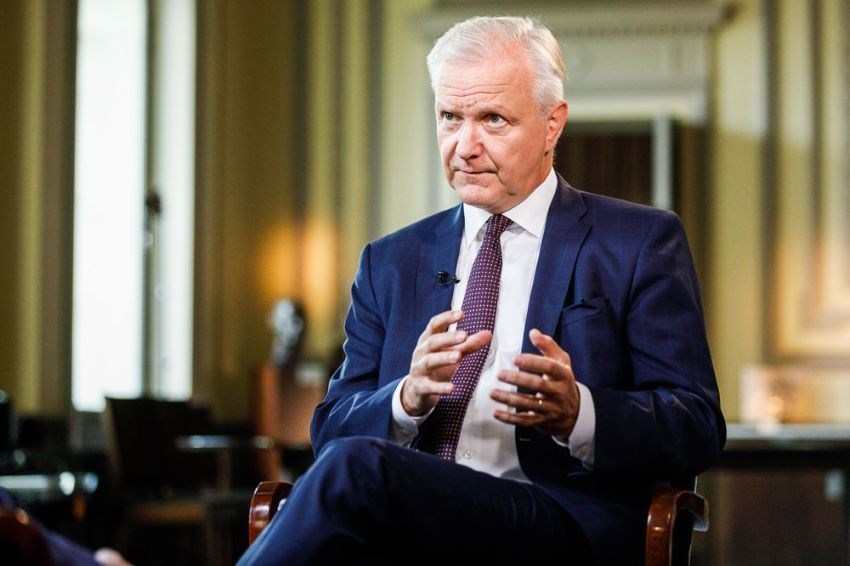
Rehn (European Central Bank), in September there will be talk of tapering. Ethenea: It’s already started

The European Central Bank will discuss a gradual exit from Pepp bond purchases at an “appropriate time”, but perhaps as early as September, Finnish Central Bank Governor Olli Rehn said this morning. Of course, my guess is September, we will discuss the future path but as mentioned, it is now important to prevent, not cure, and to ensure favorable financing conditions in the eurozone, even going forward,” Rehn said during a press conference.
For this reason, the central bank governor has confirmed, that the pandemic emergency purchase program (Pepp) of 1,850 billion euros will remain in force at least until next March, as repeatedly set by the European Central Bank. On June 10, the Board of Directors of the Central Institute did not change a comma from its monetary policy, and the head of the pigeon, Christine Lagarde, explained at a press conference that “it is too early to talk now about an exit strategy from Pepp. It is very early. The time will come, but it is certainly not the time the appropriate “.
Today, however, Rehn spoke about the possibility of discussing an exit from bond purchases within Pepp at least in September, while ECB Governing Council member Isabel Schnabel suggested yesterday afternoon that Eurotower could focus its corporate bond purchases. On companies that pollute less or that reduce emissions. “Another possibility is a more complex tilt strategy, under which the ECB can gradually calibrate its monetary policy operations based on assessments of sustainability,” Schnabel said, noting that such strategies could be implemented in the sector, company or bonds. level.
Countries such as Canada, New Zealand, Great Britain and Norway have already begun reducing their bond purchases. As the economic recovery progresses and prices are rising in all markets, we are again talking about tapering, reducing monetary policy support. “The Fed, the European Central Bank and the Bank of Japan maintain a cautious stance on this, while many smaller institutions are already reducing their bond purchases, but without causing turmoil in the markets,” said Tobias Borgrave, portfolio manager at Ethenea Independent Investors. .
Fed tapping consultations won’t start before today’s meeting and tomorrow will have to wait until the fall to adjust the bond-purchasing program. While the European Central Bank will have to wait much longer and monetary tightening is not expected before 2022. “But the central banks of Canada, England, New Zealand and many European countries outside the eurozone have already begun to reduce accommodative policies, without causing a collapse of financial markets.” .
In April, the Bank of Canada announced that it would cut its bond-purchasing program by C$1 billion (or 25%): this strengthened the national currency and caused the spreads between Canadian government bonds and US Treasuries to widen. At the end of May, the New Zealand central bank surprised the markets by announcing that it might raise interest rates as early as the second half of 2022. After the announcement, the New Zealand dollar rose and local bond yields soared.
In Europe, the Bank of England said it wanted to reduce the pace of bond buying from £4.4 billion to £3.4 billion a week, Burgrave recalled. Hungary announced a rate hike in order to prevent inflation from getting out of control, and the situation is similar in Poland and the Czech Republic: inflation is higher than the central bank’s goals, so the pressures to tighten monetary policy.
Sweden’s central bank has confirmed its intention to end its quantitative easing program by the end of 2021. Norway’s central bank has announced that it will raise interest rates in the second half of 2021 and the Icelandic central bank has already tightened monetary policy by raising interest rates on seven-day deposits. “The Fed, the European Central Bank and the Bank of Japan maintain a more cautious stance, which is set to continue and is welcomed by markets, especially by bond investors, who generally do not appreciate surprises,” Borgrave said, warning of the truth. This strategy is not without risks.
“No one knows for sure how the economy will develop and perhaps the future will prove that the Federal Reserve is right, which is expecting a recovery much sooner than expected. If the Fed is wrong, the consequences could be catastrophic: We can see the economy warming up and a rise in Inflation over 4-5%, and staying at these levels for an extended period of time. In this case, the Fed’s slowdown would be even more surprising and painful,” Ethenea’s portfolio manager warned independent investors. “Maybe this is a good time for the US Central Institute to begin gradually reducing bond purchases, or slowly winding down these operations. Other central banks are showing that this tactic can work,” Borgrad concluded. (All rights reserved)

“Organizer. Social media geek. General communicator. Bacon scholar. Proud pop culture trailblazer.”
